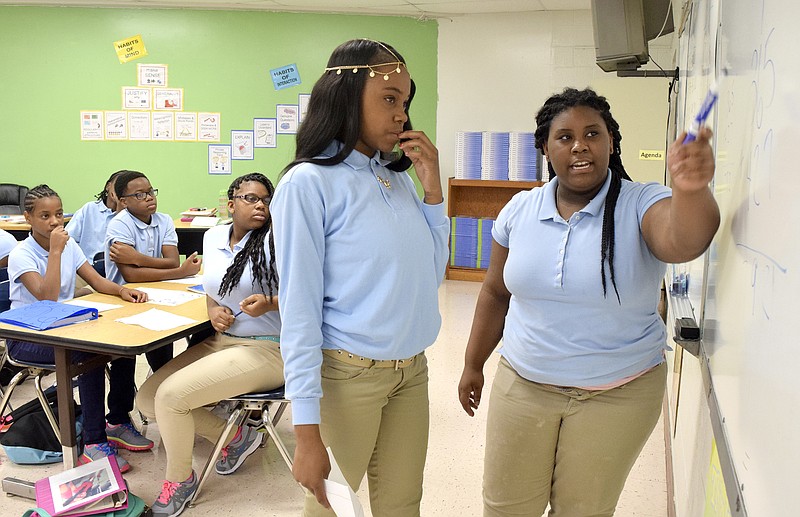Poverty creates an obstacle, but we can't let that become an excuse for why our kids can't achieve at a higher level.
The five lowest-performing schools in Hamilton County were given more than $10 million in federal funds and a marching order: turn these schools around.
The grant promised three years of financial support - about $3.5 million annually, starting in the fall of 2013 - and the potential of additional money in the future if students' test scores improved at the predominately poor schools.
These types of grants were distributed between 2012 and 2013 to more than 25 schools in Tennessee that tested in the bottom 5 percent statewide. Some of these schools are experiencing years of consistently increasing test scores, proving that students attending schools with high-concentrations of poverty can achieve
But none of those schools are in Hamilton County.
The additional funds injected into Brainerd High, Dalewood Middle, Orchard Knob Elementary, Orchard Knob Middle and Woodmore Elementary produced higher test scores in 2014, after the first year the grant money was distributed. But this year's test scores didn't show the same progress.
Mixed results
The percentage of students who scored proficient or advanced on TCAP tests in 2015 / 2014: Brainerd High School * Algebra I: 33.5 / 43.2 * English I: 31.3 / 40.8 * Biology: 18.1 / 24.5 Dalewood Elementary * Math: 20.5 / 23 * Reading Language Arts: 23 / 18.1 * Science: 37.5 / 26.3 Orchard Knob Elementary * Math: 38.6 / 34.6 * Reading Language Arts: 12.3 / 18.9 * Science: 28.3 / 30.8 Orchard Knob Middle School * Math: 16/ 14.6 * Reading Language Arts: 11.2 / 14.5 * Science: 22.4 / 20.1 Woodmore * Math: 33.5 / 36.4 * Reading Language Arts: 17.7 / 20.1 * Science: 28.5 / 23.3
These schools - known as the Innovation Zone, or iZone - lost ground this year compared to 2014 in many of the tested categories on the Tennessee Comprehensive Assessment Program, known as TCAP. In the middle and elementary schools, 16 percent of students are reading on grade level compared to 48 percent statewide. At Brainerd, only 18 percent of students scored proficient or advanced in biology, falling well below the state's average of 65 percent.
These scores are not off-track compared to statewide averages for iZone schools, but not one of the five Hamilton County schools are increasing students' test scores at the same rate as many other schools across the state that also were ranked in the bottom 5 percent. The top performers earned the highest possible ranking this year on the Tennessee Value-Added Assessment System, known as TVAAS.
That test measures the impact schools and teachers have on their students' academic progress by calculating individual student growth, and each of Hamilton County's five iZone schools, with the exception of Woodmore, was given the lowest possible TVAAS score.
Woodmore scored a three out of five this year, meaning it had "average effectiveness," but the other four schools were given a level-one ranking, meaning they are "least effective" and there is "significant evidence that the school's students made less progress than the growth standard," according to the TVAAS website.
Overall, Hamilton County's iZone schools have made progress on TCAP scores since 2013, with the exception of Orchard Knob Middle School, which has lost ground in all three tested subjects of Math, Science and Reading Language Arts.
Woodmore Elementary and Dalewood Middle School are the only two schools to make overall gains in each tested subject since 2013. Though these schools are seeing a slight increase in student test scores, they still have not been named to the state's list of improving schools, meaning their test scores haven't increased enough to move them out of the state's bottom 10 percent of schools.
Sheryl Randolph, the director of Hamilton County's iZone schools, said regardless of this year's test scores she is seeing progress within the five schools.
"Children are getting better. We have not reached that standard that [the state] set, I will agree to that, but you cannot look at these scores and say they're not getting better," Randolph said. "[Students' test scores] are moving. They are not moving as fast as we would want them to move, but that is why we have to keep coming to the table."
As the five Hamilton County iZone schools enter the last year of the Tennessee Department of Education grant, the future of additional financial resources is uncertain. Randolph hopes the state will extend the grant, but nothing is guaranteed - and the state expects outcomes.
***
According to Randolph, additional funding is helpful when educating students living in poverty, because these students are at an unfair disadvantage inside the classroom. Money also gives schools freedom to innovate and try different programs or curriculum, she said.
The five iZone schools in Hamilton County have some autonomy on how to spend the grant money allotted them, but across the five schools the bulk of the additional funds was used to provide first- and second-year teachers with training, to upgrade technology, extend the school day by 45 minutes four days a week, and offer teachers signing and retention bonuses.
The most important ingredient to student success isn't money, but having a good teacher in front of students, Randolph said. But the additional money helps attract good teachers to these schools, she said.
Hamilton County's previous iZone director, Le Andrea Ware, who recently became secondary operations director for the school district, said during her two years directing the iZone she saw how hard the daily grind of teaching in these schools was for many teachers.
"We still struggle with the retention of highly trained and effective teachers," Ware said. " This cycle of turnover presents the distraction of having to constantly recruit and retain teachers who have the grit and possess the unique skill set required to thrive in this setting."
Ware also believes that the efforts made in each of these five schools has been an overall success, citing 14 teachers who earned the "highly effective" designation and were gained or retained within the iZone schools, and the test score improvements seen at Brainerd in 2014. Scores increased by 22 percentage points in Algebra I and 14 percentage points in English I.
But officials with the iZone could not explain why Brainerd's scores in these subjects decreased by nearly 10 percentage points this year, and said no drastic changes are being made with regards to the way the money will be spent this school year in any of the schools.
"We are never afraid to revamp though," Randolph said. "we know everyone is evaluating us, so we are evaluating ourselves, too."
***
The changes school officials say are being made in Hamilton County's iZone schools are similar to those being made in other schools that tested in the bottom 5 percent of schools statewide, and are listed as priority schools by the state. Many of these priority schools in Shelby County and the Achievement School District are seeing more consistent test score gains, according to TCAP data.
The state created the Achievement School District before the start of the 2012-2013 school year by taking control of six schools in Shelby and Davidson counties. These schools were some of the lowest-performing statewide, and were separated from their zoned districts and placed in this state-led district in attempts to turn them around. Each year, the Achievement School District has grown, adding 11 schools before the 2013-2014 school year. This school year, the Achievement School District has grown to consist of 29 schools. None are in Hamilton County.
These 11 schools started receiving additional help at the same time Hamilton County received the grant. The 11 schools in the Achievement School District have since made consistent test score progress, a majority of these schools receiving the highest possible TVAAS ranking this year.
Four schools in the Achievement School District were placed on the state's list of priority improving schools due to their test score gains. No schools in Hamilton County made the list.
"Poverty creates an obstacle, but we can't let that become an excuse for why our kids can't achieve at a higher level," said Chris Barbic, superintendent of the Achievement School District.
Barbic said the progress seen in the Achievement School District is credited to great instruction and great leadership. He said change takes time; in many schools decades of poor performance has to be reversed, and this happens when a shift in school culture takes place.
Barbic said when the Achievement School District takes control of a school officials interview everyone currently working there, and a majority of the teachers choose to leave or are not rehired.
Between 10 and 30 percent of teachers in these schools stay, Barbic said, and that a "culture of performance has to be created." Once this shift takes place, student test scores typically begin to consistently increase, according to Barbic.
"This turnover work takes time," he said. "Generally, what we're seeing in our schools making progress is that it takes a two- to three-year process."
The Achievement School District operates on the philosophical approach that educators and the administrators in the school know the most about what their students need, and because of this the district is run with minimal bureaucracy and a bottom-up approach. Principals in the schools make the decisions about who to hire and remove, and are able to be innovative with curriculum and initiatives.
Barbic said this trust, support and autonomy is coupled with high expectations and pressure to produce results, as school operators and administrators are removed from schools if they are not meeting expectations.
"It's high stakes," Barbic said. " We hold them accountable for results."
In Shelby County, students in several iZone schools are seeing large gains in test scores, and two schools moved off the list of priority schools due to high test scores.
Bradley Leon, director of the iZone schools in Shelby County, said the district has been extremely pleased with the results of the iZone schools, which are making double digit gains in the overall rate of student performance.
In the schools that have been in Shelby County's iZone for two years, the same amount of time as the schools in Hamilton County, students' overall proficiency jumped from 17 to 36 percent between the last two school years.
Leon agreed with Barbic, saying leadership within the schools and strong teachers in each classroom have made the largest impact and pushed students toward success.
"It is about getting the best teachers and principals into the lowest performing schools," he said. "We should be investing more in the schools that are struggling more."
***
Out of the five iZone schools in Hamilton County, Principal Christian Earl at Dalewood Middle School was the only principal to respond to a request for comment.
Earl said he has been pleased with the school's progress, and set the goal of moving off the state's priority list for this school year, by the school earning a higher TVAAS score and testing above the 15 percent of schools statewide.
The school placed an emphasis on literacy two years ago by implementing a writing module into every subject, and Earl said this has paid off for students, as Dalewood scored the highest among iZone schools in Hamilton County on Reading Language Arts.
This year, Dalewood students lost ground in their math score compared to last year, so Earl said the school is planning to focus more on math, and has hired a numeracy coach.
"It helps when you have a focus and you're really concentrated on what you're trying to do with the students," Earl said. " And we really have quite a lot of work to do."
Contact staff writer Kendi Anderson at kendi.anderson@timesfreepress.com or 423-757-6592



